German Christmas Cookies (Lebkuchen Recipe aka German Gingerbread)
[Updated 12/2/2022] Lebkuchen, a.k.a German Gingerbread, are traditional Christmas Cookies that has been around for centuries.
It was originally invented by monks in Franconia, Germany in the late 1200s, but has evolved over the last 800+ years into numerous variations.
Here’s a look at the origins of these beloved German Christmas cookies, as well as a simple Lebkuchen recipe courtesy of Chef Mirko Peters, the Executive Chef of the Uniworld Boutique River Cruise Collection.
READ MORE: 90 Christmas Traditions Around the World
German Christmas Cookies/Lebkuchen Gingerbread Guide
- History of German Christmas Cookies
- Nürnberger Lebkuchen
- Lebkuchenherzen
- Elisen Lebkuchen
- Other Types of Lebkuchen
- Lebkuchen Recipe a.k.a. German Gingerbread
- Lebkuchen Cookies FAQs
READ MORE: 25 Fun Christmas Eve Traditions Around the World
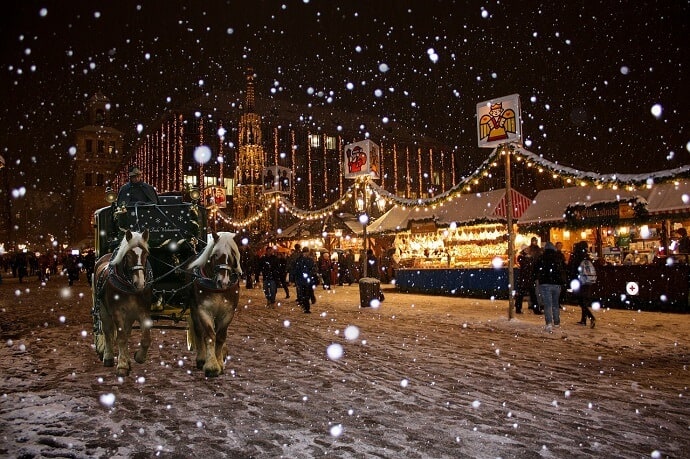
The History of German Christmas Cookies
Lebkuchen is a traditional German Christmas cookie dating back to the 13th century. The treat was invented by monks in Germany, with professional bakers recorded making the Christmas dessert as early as 1296 in Ulm and 1395 in Nuremberg.
Nuremberg quickly became the most famous exporter of the German ginger cookies, which soon garnered the name Nürnberger lebkuchen.
In those days, Nuremberg sat at the crossroads of major trade routes. So the city could easily import spices that were needed for the recipe and couldn’t be found locally.
The forest that surrounded the city, which was often called “the Emperor’s Bee Garden,” also proved important. The various brightly colored flowers there attracted bees, which in turn produced honey (the only sweetener that existed at that time).
The Lebkuchen cookie gained widespread recognition in 1487. Emperor Fredrich III held a general assembly in Nuremberg, inviting nearly 4,000 children from across the city to attend.
At the special event, he presented the children with German Christmas cookies that were decorated with his own portrait.
In order to officially recognize the profession and create specific guidelines that had to be followed in order to sell the cookies, Nuremberg went on the create the “League of Lebkuchen Bakers” in 1643.
Ever since then, Lebkuchen cookies have remained a popular German Christmas delicacy. They have become a common Christmas cookie tradition, not just in Germany but in many other European and North American countries as well.
READ MORE: The 20 Best Places to Spend Christmas in the USA
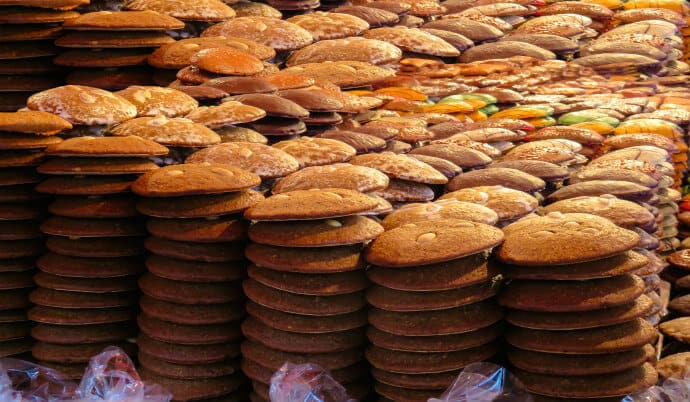
Nürnberger Lebkuchen
Since their creation, Lebkuchen have been baked and prepared in a variety of ways, differing in shape, flavor, and style of presentation.
The most well-known type is Nürnberger lebkuchen. Recognized for their soft texture, they include marzipan as a main ingredient, and have remained fairly true to the original recipe that was created in Nuremberg in 1395.
One popular variation of Nürnberger lebkuchen is kaiserlein, which are just lebkuchen that have an imprinted or drawn picture on them for decoration.
READ MORE: The 25 Best Places to Spend Christmas in Europe
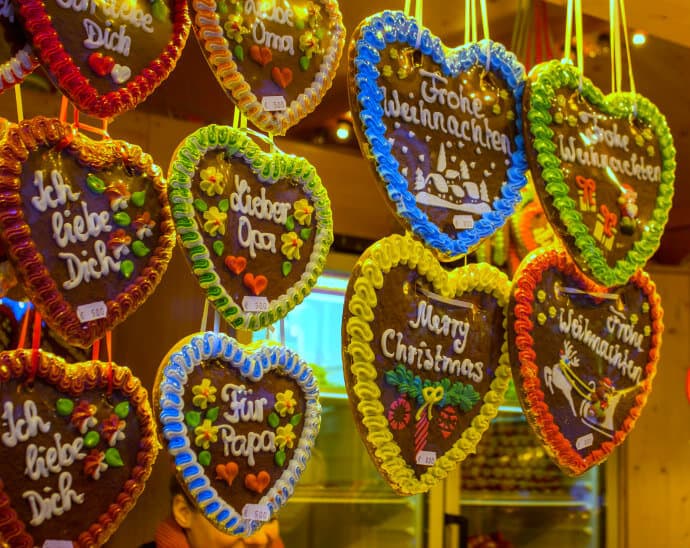
Lebkuchenherzen
Lebkuchenherzen is harder and crunchier than other types of lebkuchen.
They’re typically made in the shape of a heart, with delicate icing detailing on the top.
This variation gained popularity after becoming a staple at Oktoberfest, and are often delivered with loving or funny messages.
READ MORE: 30 Symbols of Christmas: History & Meaning of Xmas Decorations
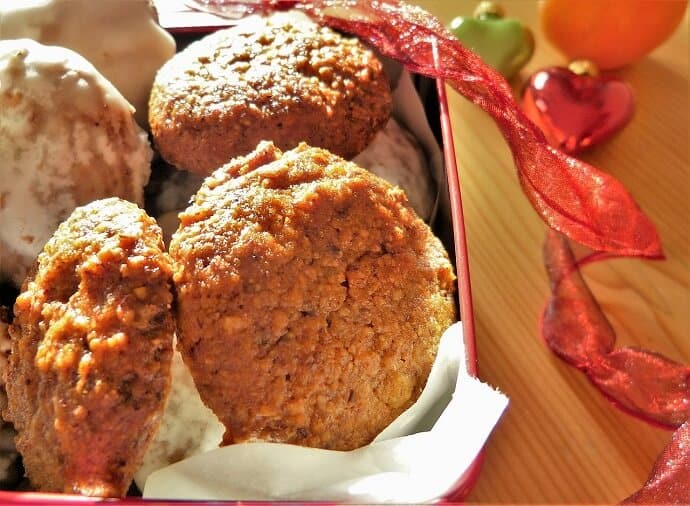
Elisen Lebkuchen
Elisen Lebkuchen are widely considered to be the highest quality of lebkuchen available.
It is generally required that they have at least 25% almonds, hazelnuts, and/or walnuts in the recipe, as well as no more than 10% flour.
READ MORE: 15 Simple Recycled Christmas Cards Crafts for Kids
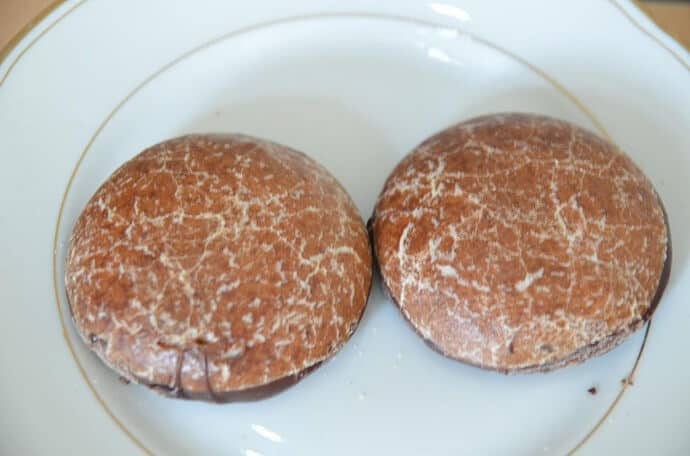
Other Types of Lebkuchen
Braune lebkuchen (brown gingerbread) is baked with honey, and the dough is usually shaped into a mold.
Once baked, they are usually coated in a glaze mixture or dipped in chocolate.
Weisse lebkuchen (white gingerbread) use a large amount of egg whites in the dough giving them a lighter appearance once cooked. They are commonly decorated with almonds and orange or lemon peels.
READ MORE: 30 Recycled Christmas Decorations & DIY Christmas Crafts
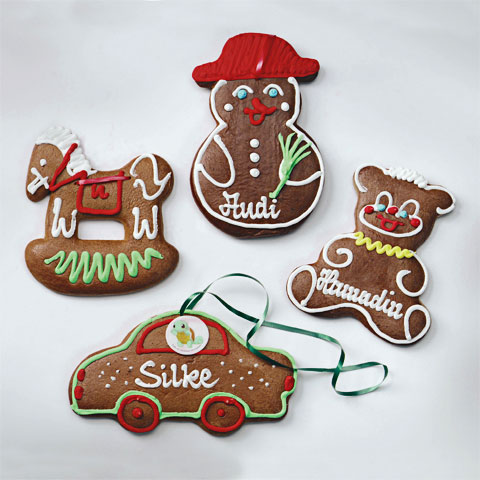
Lebkuchen Recipe (aka German Gingerbread)
This traditional Lebkuchen recipe comes to us courtesy of Chef Mirko Peters, the Executive Chef of the Uniworld Boutique River Cruise Collection.
Try decorating them with white, green, and red frosting for an especially festive holiday treat!
INGREDIENTS:
- 3 cups flour
- 1 1/4 tsp. nutmeg
- 1 1/4 tsp. cinnamon
- 1/2 tsp. baking soda
- 1/2 tsp. cloves
- 1/2 tsp. allspice
- 1 egg
- 3/4 cup packed brown sugar
- 1/2 cup honey
- 1 cup dark molasses
- 1/2 cup slivered almonds
- 1/2 cup mixed chopped candied fruits & peels
LEMON GLAZE INGREDIENTS:
- 1 slightly beaten egg white
- 1 1/2 cups powdered sugar
- 1/2 tsp. finely shredded lemon peel
- 1 tbsp. lemon juice
- dash of salt
DIRECTIONS:
- Stir together dry ingredients.
- In a separate bowl, beat the egg. Add the brown sugar and beat until fluffy. Stir in honey and molasses and beat until well mixed.
- Add dry ingredients to the mixture, stirring well until combined. Stir in nuts and fruits. Chill overnight.
- Roll chilled dough on a floured surface into a 14-inch square. Cut into 3 1/2 x 2-inch rectangles or use cookie cutters to form the desired shapes.
- Place 2 inches apart on greased cookie sheet and bake at 375°F for 12 to 14 minutes.
- Let cool 1 minute before moving to wire rack.
- While Lebkuchen is baking, make the lemon glaze.
- Combine all ingredients and mix well. Brush onto the cookies while they are still warm.
READ MORE: The History & Names for Santa Claus Around the World
Lebkuchen Cookies FAQs
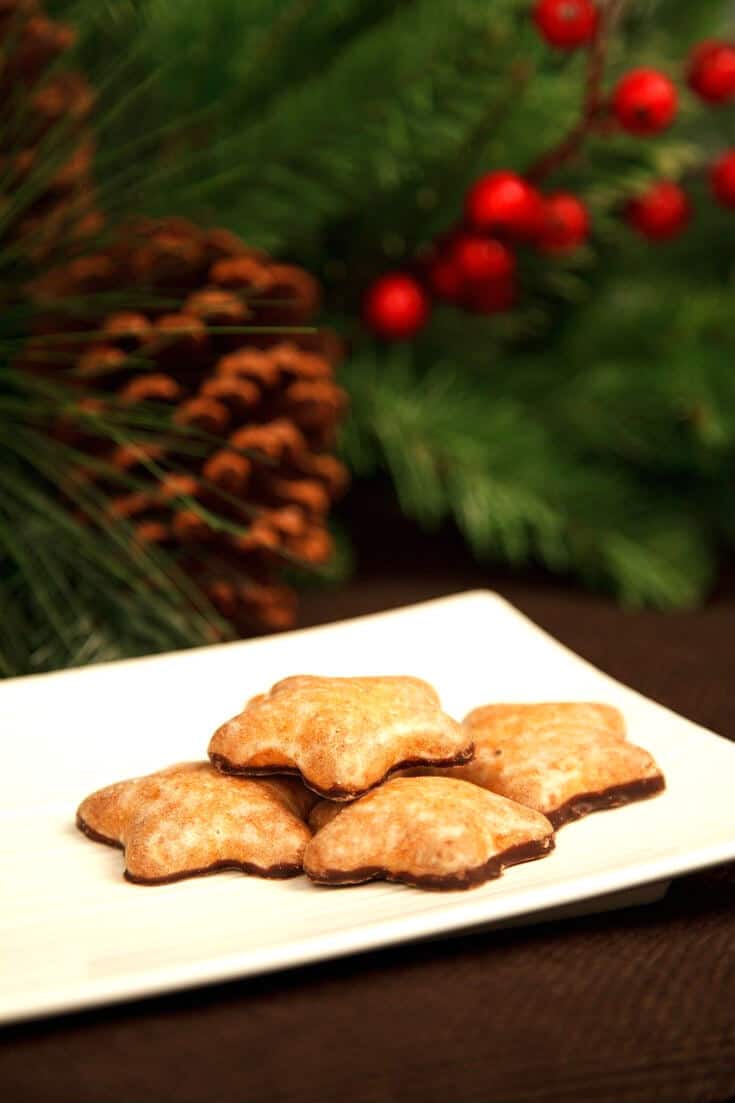
What is on the bottom of Lebkuchen?
The thin, paper-like wafer on the bottom of lebkuchen is called an Oblaten. It was originally used by monks as a means to prevent the dough from sticking.
It is made out of flour, so it is completely edible. But if you prefer, it can be peeled off of the cookie before eating.
READ MORE: 40 Ways to Celebrate New Year Traditions Around the World
What does Lebkuchen taste like?
The taste of lebkuchen varies slightly– from spicy to sweet– based on the type and individual recipe used to make the German gingerbread.
In general the cookie has a lightly nutty taste, with just the right amount of spice peaking through to make them flavorful.
It is generally a fairly chewy dessert, with a cake-like texture inside and a slight crunch on the outside.
READ MORE: The 21 Best Environmental Charities & Animal Charities for Holiday Donations
What is the difference between Pfeffernuse and Lebkuchen?
Pfeffernuse and lebkuchen are both German Christmas cookies that include similar main ingredients, like flour, honey, and a blend of various spices to add flavor.
The main difference between the two traditional foods is that lebkuchen is made with nuts, while pfeffernusse is not.
Pfeffernusse also have a dome shape, whereas lebkuchen tend to be flatter.
READ MORE: 45 Fascinating Christmas Traditions in Mexico
What is Lebkuchen Allerlei?
Lebkuchen Allerlei is a variation of braune (brown) lebkuchen.
They have a light and cakey texture, and tend to be heavily spiced.
Once baked, they can be served plain, glazed, or covered in chocolate. They usually tend to be served in an assorted variety. – by Christina Maggitas; lead photo via Pixabay
Best Food Gifts From Around the World









